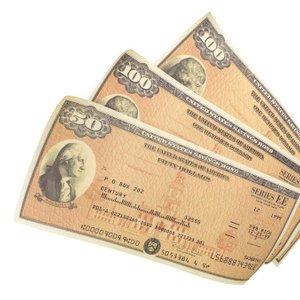
You can buy paper EE and I savings bonds through banks and other savings institutions, or buy electronic bonds online at Treasury Direct. You can title the bonds with yourself as sole owner, or with a beneficiary. Depending on whether you purchase paper or electronic bonds, you can also have a co-owner or secondary owner. The exact title on the bonds determines who can cash them and also has tax consequences.
Co-ownership
The Treasury offers true co-ownership only for paper savings bonds. If you register a paper EE or I bond with two co-owners, either co-owner can cash it without permission from the other owner. When one co-owner dies, the bond becomes the sole property of the remaining owner.
Beneficiary
If you register a paper or electronic EE or I bond with one owner and a beneficiary, only the registered owner can cash the bond during her life. After the death of the owner, the bond becomes the sole property of the beneficiary, who can now cash the bond. This beneficiary designation is the same as POD, or payable on death.
Electronic Bonds
Electronic bonds cannot have registered co-owners. For electronic bonds, which you purchase online at Treasury Direct, you must register the two owners as a primary owner and a secondary owner. The title printed on the bond includes the name of the primary owner and social security number, followed by the word "with" plus the name of the secondary owner and social security number. Only the primary owner can cash the bond during her lifetime. After the death of the primary owner, the secondary owner becomes the sole owner and inherits the right to cash the bond.
Income Taxes and Co-ownership
Someone must eventually pay federal income tax on the interest from savings bonds. You can choose to report the interest annually on your tax return, or you can defer it, normally until final maturity or redemption. Responsibility for taxes on bonds with co-owners depends on several factors. If you use your money to purchase a bond and add a second person to the bond as co-owner, you must report the interest personally. If each co-owner contributes to the purchase price, they divide the tax liability in the same proportion. In a community property state, if you purchase a bond with your spouse as community property, you normally share the tax responsibility equally.
Your Bonds' Value
You can find out the value of your savings bond portfolio online. If you have electronic savings bonds, use your Treasury Direct account to track them. If you have paper bonds, use the Savings Bond Calculator at Treasury Direct. Enter the series, denomination, serial number and purchase date of your bonds to find the accrued interest and total value.
References
- Treasury Direct; Register an EE or I Bond
- Treasury Direct: Series EE/E Savings Bonds Tax Considerations
- Treasury Direct: Series I Savings Bonds Tax Considerations
- Treasury Direct: Press Room FAQs
- TreasuryDirect.gov. "Series I Savings Bonds." Accessed Feb. 7, 2020.
- TreasuryDirect.gov. "Tax Considerations for I Bonds." Accessed Feb. 7, 2020.
- TreasuryDirect.gov. "Series I Savings Bonds FAQs." Accessed Feb. 7, 2020.
- TreasuryDirect.com. "Treasury Inflation-Protected Securities (TIPS)." Accessed Feb. 7, 2020.

